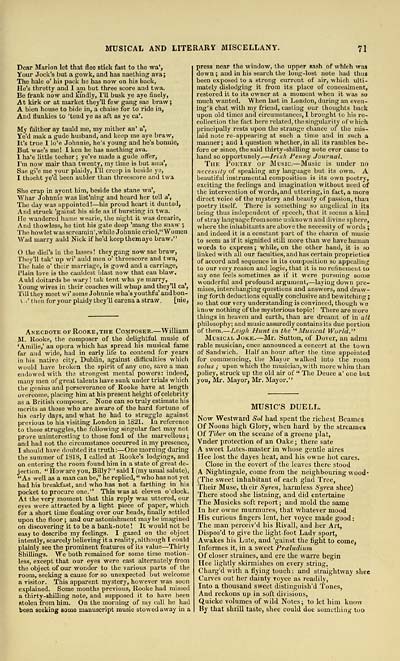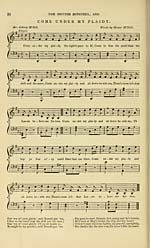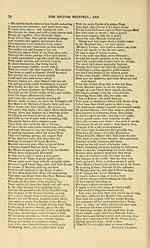Glen Collection of printed music > Printed music > British minstrel, and musical and literary miscellany
(79) Page 71
Download files
Complete book:
Individual page:
Thumbnail gallery: Grid view | List view

MUSICAL AND LITERARY MISCELLANY.
71
Dear Marion let that flee stick fast to tlie wa',
Your Jock's but a gowk, and has naething ava;
The hale o' his pack lie has now on his back,
He's thretty and I am but three score and twa.
Be frank now and iTindly, I'll busk ye aye finely,
At kirk or at market they'll few gang sae braw;
A bien house to bide in, a chaise for to ride in,
And flunkies to 'tend ye as aft as ye ca'.
My faither ay tauld me, my mither an' a',
Yo'd mak a gude husband, and keep me aye braw,
It's true I lo'e Johnnie, he's young and he's bonnie.
But wae's me! I ken he has naething ava.
I ha'e little tocher ; ye've made a gude oifer,
I'm now mair than twenty, my time is but sina',
Sae gi'e me your plaidy, I'll creep in beside ye,
I thocht ye'd been aulder than threescore and twa
She crap in ayont him, beside the stane wa',
Wliar Johnnie was list'ning and heard her tell a',
'riio day was appointed I — his proud heart it dunted.
And struck 'gainst his side as if bursting in twa.
He wandered bame wearie, the night it was drearie.
And thowless, he tint his gate deep 'mang the snaw ;
The howletwasscreamin', while Johnnie cried,"Women
Wad marry auld Nick if he'd keep them aye braw."
O the diel's in the lasses ! they gang now sae braw,
They'll tak' up wi' auld men o' threescore and twa,
The hale o' their marriage, is gowd and a carriage.
Plain love is the cauldest blast now that can blaw.
Auld doitards be wary I tak tent wha ye marry.
Young wives in their coaches will whup and they'll ca'.
Till they meet wi' some Johnnie wha's youthfu' andbon-
\ t' then for your plaidy they'll cai-ena a straw. [nie.
Anecdote OF RooKE, THE Composer. — William
M. Rooke, the composer of the delightful music of
'Amilie,' an opera which has spread his musical fame
far and wide, had in early life to contend for years
in his native city, Dublin, against difficulties which
wduld have broken the spirit of any one, save a man
endowed with the strongest mental powers: indeed,
many men of great talents have sunk under trials wliich
tlie genius and perseverance of Rooke have at length
overcome, placing him at his present height of celebrity
us a British composer. None can so truly estimate his
merits as those who are aware of the hard fortune of
his early days, and what he had to struggle against
previous to his visiting London in 1821. In reference
to these struggles, the following singuUxr fact may not
prove uninteresting to those fond of the marvellous ;
and had not the circumstance occurred in my presence,
I should have doubted its truth:— One morning during
the summer of 1818, 1 called at Rooke's lodgings, and
on entering the room found him in a state of great de-
jection. " How are you, Billy?" said I (my usual salute),
"As well as a man can be," he replied, " who has not yet
had his breakfast, and who has not a farthing in his
pocket to procure one." This was at eleven o'clock.
At the very moment that this reply was uttered, our
eyes were attracted by a light piece of paper, which
for a short time floating over our heads, hnally settled
upon the floor ; and our astonishment may be imagined
on discovering it to be a bank-note ! It would not be
easy to describe my feelings. I gazed on the object
intently, scarcely believing it a reality, although I could
plainly see the prominent features of its value — Thirty
Shillings. We both remained for some time motion-
less, except that our eyes were cast alternately from
the object of our wonder to the various parts of the
room, seeking a cause for so unexpected but welcome
a visitor. Tiiis apparent mystery, however was soon
explained. Some months previous, Rooke had missed
a thirty-shilling note, and supposed it to have been
Ktolen from him. On the morning of my call he had
been seeking some manuscript music stowed away in a
press near the window, the upper sash of which was
down ; and in his search the long-lost note had thus
been exposed to a strong current of air, which ulti-
mately dislodging it from its place of concealment,
restored it to its owner at a moment when it was so
much wanted. When last in London, during an even-
ing's chat with my friend, casting our thoughts back
upon old times and circumstances, I broi'.ght to his re-
collection the fact here related, the singulai"ity of which
f)rincipally rests upon the strange chance of the mis-
aid note re-appearing at such a time and in snch a
manner ; and I question whether, in all its rambles be-
fore or since, the said thirty -shilling note ever came to
hand so opportunely. — Irish J^e/tny Journal.
The Poetrv of Music. — Music is under no
necessity of speaking any language but its own. A
beautiful instrumental composition is its own poetry,
exciting the feelings and imagination without need of
the intervention of words, and uttering, in fact, a more
direct voice of the mystery and beauty of passion, than
poetry itself. There is something so angelical in its
being thus independent of speech, that it seems a kind
of stray language from some unknown and divine sphere,
where the inhabitants are above the necessity of words ;
and indeed it is a constant part of the charm of nmsic
to seem as if it signified still more than we have human
words to express ; while, on the other hand, it is so
linked with all our faculties, and has certain proprieties
of accord and sequence in its composition so appealing
to our very reason and logic, that it is no refinement to
say one feels sometimes as if it were pursuing some
wonderful and profound argument, — laying down pre-
mises, interchanging questions and answers, and draw-
ing forth deductions equally conclusive and bewitching;
so that our very understanding is convinced, though we
know nothing of the mysterious topici There are more
things in heaven and earth, than are dreamt of in all
philosophy; and music assuredly contains its due portion
of them. — Leigh Hunt in the "Musical World."
Musical Joke. — Mr. Sutton, of Dover, an adnu
rable musician, once announced a concert at the town
of Sandwich. Half an hour after the time appointed
for commencing, the Mayor walked into the room
solus ; upon which the musician, with more whim than
policy, struck up the old air of " The Deuce a' one but
you, Mr. Mayor, Mr. Mayor."
MUSIC'S DUELL.
Now Westward Sol had spent the richest Beamcs
Of Noons high Glory, when hard by the streames
Of Tiber on the sceane of a greene plat,
Vnder protection of an Oake ; there sate
A sweet Lutes-master in whose gentle aires
Hee lost the dayes heat, and his owne hot cares.
Close in the covert of the leaves there stood
A Nightingale, come from the neighbouring wood-
(The sweet inhabitant of each glad Tree,
Their Muse, their Syren, harmless Syren shee)
There stood she listning, and did entertaine
The Musicks soft report ; and mold the same
In her owne murmures, that whatever mood
His curious fingers lent, her voyce made good:
The man perceiv'd his Rivall, and her Art,
Dispos'd to give the light- foot Lady sport.
Awakes his Lute, and 'gainst the fight to come,
Informes it, in a sweet Prceludium
Of closer straines, and ere the warre begin
Hee lightly skirmishes on every string,
Charg'd with a flying touch : and straightway shee
Carves out her dainty voyce as readily,
Into a thousand sweet distinguish'd Tones,
And reckons up in soft divisions,
Quicke volumes of wild Notes; to let him know
By that shrill taste, shee could doe something too
71
Dear Marion let that flee stick fast to tlie wa',
Your Jock's but a gowk, and has naething ava;
The hale o' his pack lie has now on his back,
He's thretty and I am but three score and twa.
Be frank now and iTindly, I'll busk ye aye finely,
At kirk or at market they'll few gang sae braw;
A bien house to bide in, a chaise for to ride in,
And flunkies to 'tend ye as aft as ye ca'.
My faither ay tauld me, my mither an' a',
Yo'd mak a gude husband, and keep me aye braw,
It's true I lo'e Johnnie, he's young and he's bonnie.
But wae's me! I ken he has naething ava.
I ha'e little tocher ; ye've made a gude oifer,
I'm now mair than twenty, my time is but sina',
Sae gi'e me your plaidy, I'll creep in beside ye,
I thocht ye'd been aulder than threescore and twa
She crap in ayont him, beside the stane wa',
Wliar Johnnie was list'ning and heard her tell a',
'riio day was appointed I — his proud heart it dunted.
And struck 'gainst his side as if bursting in twa.
He wandered bame wearie, the night it was drearie.
And thowless, he tint his gate deep 'mang the snaw ;
The howletwasscreamin', while Johnnie cried,"Women
Wad marry auld Nick if he'd keep them aye braw."
O the diel's in the lasses ! they gang now sae braw,
They'll tak' up wi' auld men o' threescore and twa,
The hale o' their marriage, is gowd and a carriage.
Plain love is the cauldest blast now that can blaw.
Auld doitards be wary I tak tent wha ye marry.
Young wives in their coaches will whup and they'll ca'.
Till they meet wi' some Johnnie wha's youthfu' andbon-
\ t' then for your plaidy they'll cai-ena a straw. [nie.
Anecdote OF RooKE, THE Composer. — William
M. Rooke, the composer of the delightful music of
'Amilie,' an opera which has spread his musical fame
far and wide, had in early life to contend for years
in his native city, Dublin, against difficulties which
wduld have broken the spirit of any one, save a man
endowed with the strongest mental powers: indeed,
many men of great talents have sunk under trials wliich
tlie genius and perseverance of Rooke have at length
overcome, placing him at his present height of celebrity
us a British composer. None can so truly estimate his
merits as those who are aware of the hard fortune of
his early days, and what he had to struggle against
previous to his visiting London in 1821. In reference
to these struggles, the following singuUxr fact may not
prove uninteresting to those fond of the marvellous ;
and had not the circumstance occurred in my presence,
I should have doubted its truth:— One morning during
the summer of 1818, 1 called at Rooke's lodgings, and
on entering the room found him in a state of great de-
jection. " How are you, Billy?" said I (my usual salute),
"As well as a man can be," he replied, " who has not yet
had his breakfast, and who has not a farthing in his
pocket to procure one." This was at eleven o'clock.
At the very moment that this reply was uttered, our
eyes were attracted by a light piece of paper, which
for a short time floating over our heads, hnally settled
upon the floor ; and our astonishment may be imagined
on discovering it to be a bank-note ! It would not be
easy to describe my feelings. I gazed on the object
intently, scarcely believing it a reality, although I could
plainly see the prominent features of its value — Thirty
Shillings. We both remained for some time motion-
less, except that our eyes were cast alternately from
the object of our wonder to the various parts of the
room, seeking a cause for so unexpected but welcome
a visitor. Tiiis apparent mystery, however was soon
explained. Some months previous, Rooke had missed
a thirty-shilling note, and supposed it to have been
Ktolen from him. On the morning of my call he had
been seeking some manuscript music stowed away in a
press near the window, the upper sash of which was
down ; and in his search the long-lost note had thus
been exposed to a strong current of air, which ulti-
mately dislodging it from its place of concealment,
restored it to its owner at a moment when it was so
much wanted. When last in London, during an even-
ing's chat with my friend, casting our thoughts back
upon old times and circumstances, I broi'.ght to his re-
collection the fact here related, the singulai"ity of which
f)rincipally rests upon the strange chance of the mis-
aid note re-appearing at such a time and in snch a
manner ; and I question whether, in all its rambles be-
fore or since, the said thirty -shilling note ever came to
hand so opportunely. — Irish J^e/tny Journal.
The Poetrv of Music. — Music is under no
necessity of speaking any language but its own. A
beautiful instrumental composition is its own poetry,
exciting the feelings and imagination without need of
the intervention of words, and uttering, in fact, a more
direct voice of the mystery and beauty of passion, than
poetry itself. There is something so angelical in its
being thus independent of speech, that it seems a kind
of stray language from some unknown and divine sphere,
where the inhabitants are above the necessity of words ;
and indeed it is a constant part of the charm of nmsic
to seem as if it signified still more than we have human
words to express ; while, on the other hand, it is so
linked with all our faculties, and has certain proprieties
of accord and sequence in its composition so appealing
to our very reason and logic, that it is no refinement to
say one feels sometimes as if it were pursuing some
wonderful and profound argument, — laying down pre-
mises, interchanging questions and answers, and draw-
ing forth deductions equally conclusive and bewitching;
so that our very understanding is convinced, though we
know nothing of the mysterious topici There are more
things in heaven and earth, than are dreamt of in all
philosophy; and music assuredly contains its due portion
of them. — Leigh Hunt in the "Musical World."
Musical Joke. — Mr. Sutton, of Dover, an adnu
rable musician, once announced a concert at the town
of Sandwich. Half an hour after the time appointed
for commencing, the Mayor walked into the room
solus ; upon which the musician, with more whim than
policy, struck up the old air of " The Deuce a' one but
you, Mr. Mayor, Mr. Mayor."
MUSIC'S DUELL.
Now Westward Sol had spent the richest Beamcs
Of Noons high Glory, when hard by the streames
Of Tiber on the sceane of a greene plat,
Vnder protection of an Oake ; there sate
A sweet Lutes-master in whose gentle aires
Hee lost the dayes heat, and his owne hot cares.
Close in the covert of the leaves there stood
A Nightingale, come from the neighbouring wood-
(The sweet inhabitant of each glad Tree,
Their Muse, their Syren, harmless Syren shee)
There stood she listning, and did entertaine
The Musicks soft report ; and mold the same
In her owne murmures, that whatever mood
His curious fingers lent, her voyce made good:
The man perceiv'd his Rivall, and her Art,
Dispos'd to give the light- foot Lady sport.
Awakes his Lute, and 'gainst the fight to come,
Informes it, in a sweet Prceludium
Of closer straines, and ere the warre begin
Hee lightly skirmishes on every string,
Charg'd with a flying touch : and straightway shee
Carves out her dainty voyce as readily,
Into a thousand sweet distinguish'd Tones,
And reckons up in soft divisions,
Quicke volumes of wild Notes; to let him know
By that shrill taste, shee could doe something too
Set display mode to: Large image | Transcription
Images and transcriptions on this page, including medium image downloads, may be used under the Creative Commons Attribution 4.0 International Licence unless otherwise stated. ![]()
| Special collections of printed music > Glen Collection of printed music > Printed music > British minstrel, and musical and literary miscellany > (79) Page 71 |
|---|
| Permanent URL | https://digital.nls.uk/91435893 |
|---|
| Description | Scottish songs and music of the 18th and early 19th centuries, including music for the Highland bagpipe. These are selected items from the collection of John Glen (1833 to 1904). Also includes a few manuscripts, some treatises, and other books on the subject. |
|---|
| Description | The Glen Collection and the Inglis Collection represent mainly 18th and 19th century Scottish music, including Scottish songs. The collections of Berlioz and Verdi collected by bibliographer Cecil Hopkinson contain contemporary and later editions of the works of the two composers Berlioz and Verdi. |
|---|

